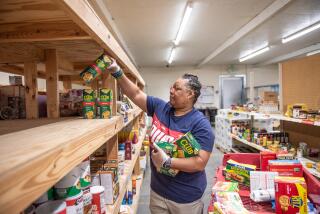Drug Dealers Are Key Players in Thriving Food-Stamp Program Fraud
- Share via
WASHINGTON — For two years, Evelyn Branham, a single mother on welfare, had a routine she’d follow the day she received her monthly allotment of federal food stamps. Branham would count her $290 worth of coupons and then hit the streets near her Northwest Washington apartment. Within hours, the mother of four says, she succeeded in trading $100 worth of stamps for $50 in cash or a fix of heroin from dealers, or “anyone who would trade.”
Branham says, and law-enforcement officials agree, that her dealer most likely then took the stamps to a neighborhood grocery store, one of 220,000 businesses nationwide authorized by the federal government to exchange them for food. The dealer then sold the $100 worth of stamps for $75 in cash to a store proprietor, a transaction that netted the dealer a $25 profit.
A few days later, the store owner turned the stamps into a bank, which then redeemed the coupons at the Federal Reserve Bank for $100 in cash. In the process, the store owner was $25 richer without selling anything off his shelves.
The losers in this transaction are the taxpayers, who pay for food stamps; the federal government, which administers the multibillion-dollar entitlement program, and people like Evelyn Branham, who need the coupons to adequately feed her family.
Officials at the Department of Agriculture estimate that fraud costs the agency about 1.5% of the annual $14-billion food-stamp budget. How much of that loss is fueled by drug trafficking alone is unclear, although officials say they believe the rate is increasing.
“I think it’s a combination of things,” said Rep. Ron Wyden (D-Ore.), who last year held congressional hearings on food-stamp fraud. “Drug dealers are getting more creative, and as law enforcement moves to shut down one route, another emerges. The fact is, this is a sector of our economy that is expanding, and it’s part of the underground economy.”
Several months ago, Wyden sponsored an amendment to the 1990 farm bill, recently signed by President Bush, that will strengthen penalties for food-stamp trafficking. Wyden said he is concerned about what happens to the most defenseless sufferers in such scams: children, who represent more than half of the nation’s 20 million food-stamp beneficiaries.
“This is one of the worst forms of corruption I’ve seen, because it contributes to the drug problem and takes away food from children who have nothing else to eat. You hurt two generations of people,” Wyden said.
Like many federal programs, the food-stamp program has had its share of fraud and abuse since its inception in 1961. The program has long been a favorite target of conservative lawmakers who railed against “welfare queens” who somehow managed to bilk federal aid programs for luxury items.
But, USDA officials note, the most costly scams in the food-stamp program often have originated or involved the federal employees assigned to monitor and distribute the coupons, not the poor who receive them. And even the most vociferous critics acknowledge that the food-stamp program has helped feed tens of millions of Americans.
“The program is remarkably successful and makes a tremendous difference,” said Robert Fersh, executive director of the Food Research and Action Center, a private, nonprofit organization that studies hunger. “But it is credible to me that a small minority use it for criminal purposes. I think it’s a problem not so much with food stamps as it is with other social ills.”
The problem of trading stamps for drugs or for money to buy them marks the latest chapter in the abuse of food stamps. Law-enforcement officials and authorities in the USDA’s Office of the Inspector General say such incidents have proliferated in the last few years in cities as diverse as Kansas City, Albuquerque, Los Angeles and the District of Columbia.
“Food stamps have been misused as long as they’ve been on the market,” said Capt. Colin Younger, chief of the narcotics branch of the District of Columbia’s Metropolitan Police Department. “But in the past couple years, they’ve been feeding the drug trade in a number of large cities,” including Washington.
“We have found (food stamps) being traded for guns, for boats, for everything,” said William Galyean Jr., the regional USDA inspector general who coordinated the arrest of 39 people on charges of food-stamp trafficking and drug-related violations in Washington and Baltimore last August.
“Food stamps are a second currency,” said Galyean, “and drugs have become part of it. What you’re seeing here is a taste of what is going on around the country.”
The USDA’s Food and Nutrition Service, which administers the food-stamp program, began concentrating on the connection between drugs and paper food coupons two years ago as part of the Bush Administration’s war on drugs.
The number of prosecutions by the Office of the Inspector General--although limited by the paucity of agents allocated to such investigations--has increased from two cases in 1986 to 72 in 1989, the latest year for which statistics are available.
Branham says she stopped selling her food stamps in 1987, when she quit using drugs. Branham was never prosecuted for food-stamp fraud, although she was arrested several times for prostitution and writing bad checks, the only other ways she says she knew to earn money for her drug habit.
Branham says, and law-enforcement officials confirm, that the underground market in food stamps is a thriving business in her neighborhood.
Law-enforcement officials say that, when they are able to prosecute cases of food-stamp fraud, punishment has not been much of a deterrent.
“The problem is in the scheme of things, although the crime is terrible because of the people it preys on, food-stamp fraud is a nonviolent crime and people are not going to get jail time for it,” said Haven Kodeck, a assistant state’s attorney in Baltimore.
More to Read
Sign up for Essential California
The most important California stories and recommendations in your inbox every morning.
You may occasionally receive promotional content from the Los Angeles Times.










